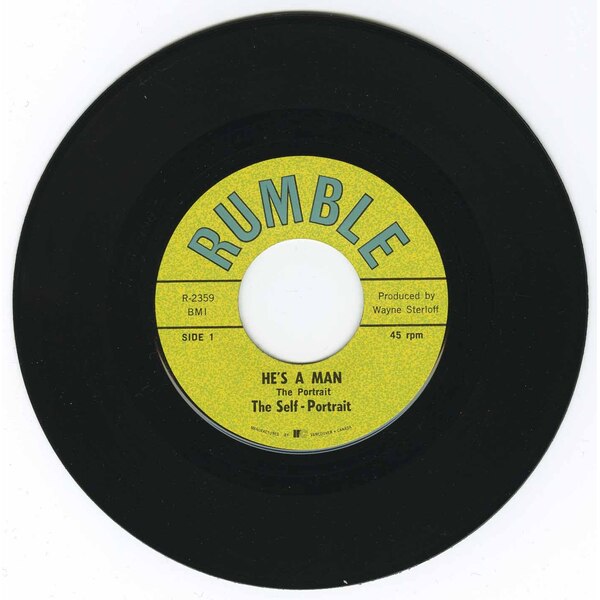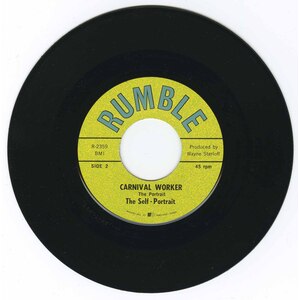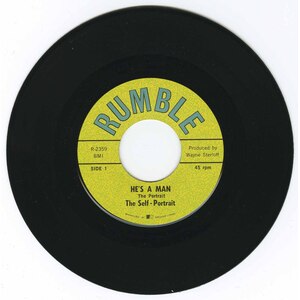Information/Write-up
Self Portrait was formed in 1966 in Vancouver, British Columbia, marking the first official recording project for Frank Ludwig, who would later gain national fame as the keyboardist and vocalist for Trooper during their chart-topping years in the 1970s.
Originally hailing from Richmond, B.C., the founding members were young musicians drawn together by their shared love of rock and roll and the surge of energy that followed the British Invasion. The core lineup featured:
Frank Ludwig: keyboards, vocals, and keyboard bass
Ron Sullivan: guitar, lead vocals
Jimmy Taylor: drums, backing vocals
Graham Crowell: bass
Initially performing under various names—including Ray and the Rayvens and The Lancers—the group cycled through local high schools and clubs, playing a mix of covers and original material. Their early repertoire included "The Outer Limits Theme," "Wild Weekend," and the Beatles’ version of "Money." Often learning by ear, the band honed its sound in the grassroots DIY spirit of the era.
They recorded demo tracks and eventually released a single on the independent Vancouver label Rumble Records, started by Wayne Stirloff in 1968 (Stirloff later joined SOCAN). The A-side, "He's a Man," later appeared on the 1983 collector’s compilation History of Vancouver Rock and Roll, Volume 3. The B-side was "Carnival Worker," featuring drummer Jimmy Taylor on lead vocals. While neither song charted, the single has become a sought-after rarity among collectors, with Ludwig reportedly gifting two mint copies to a friend in exchange for studio help.
Musically inventive, Self Portrait evolved into a trio when Graham Crowell left to pursue an acting career. Ludwig covered bass parts using a Fender keyboard bass while alternating between a clavinet and a Vox Super Continental organ, run through a Leslie speaker to approximate the sound of a Hammond B3. This setup allowed the band to remain portable without sacrificing depth.
Ludwig joined the band while studying music at the University of British Columbia. His transition from a cover act to a recording artist marked a turning point. Despite being new to instruments like the oboe and English horn, he contributed both to their recordings—sometimes under challenging recording conditions. A live tape from 1970 even features an original song with drummer Jimmy Taylor on lead vocals.
The group maintained an active gigging schedule throughout 1970, with a full calendar of shows under the name "Self Portrait Breakers," suggesting a strong presence on the Vancouver-area club circuit. Their promotional material at the time billed them as “funkier than Grand Funk and smoother than Creme,” highlighting performances at venues like The Daisy, Breakers, the Barclay in Port Alberni, Gas House in Trail, and the Marco Polo. They were also a featured act at major pop festivals in Edmonton, Penticton, and Victoria. Their repertoire ranged from the Beatles to Sly & the Family Stone, Creedence Clearwater Revival, and Blood, Sweat & Tears—aiming to satisfy both music lovers and dancers alike.
The band officially disbanded when Ludwig left to join Trooper in 1975, just before the recording of their breakout LP Two For The Show, which was produced by Randy Bachman. The album yielded Canadian top 10 hits like "Santa Maria" and the title track, earning the band Juno Award nominations in 1977 for Most Promising Group and Composer of the Year. Trooper followed up with Knock 'Em Dead Kid (1977), which included Ludwig’s track "Waitin' On Your Love," and the hit singles "We're Here for a Good Time" and "O Pretty Lady."
In 1978, Thick as Thieves was released, featuring Ludwig’s best-known contribution, "Round, Round We Go," as well as "The Moment That It Takes" and the unreleased "It's a Fine Mess." That year, Trooper received Juno nominations for Best Selling Album and Group of the Year. Ludwig himself was nominated for a Juno as Top Pianist, a category that included Oscar Peterson and Burton Cummings.
Trooper's 1979 compilation Hot Shots became the best-selling album in Canadian history at the time, going 6x platinum. Ludwig’s final studio album with the band was Flying Colours (1979), where he contributed to the writing and singing of several tracks. Internal conflicts regarding songwriting credits ultimately led to his departure. His last concert with Trooper was at Edmonton’s Commonwealth Stadium in 1979, the same year Trooper won Juno Group of the Year.
He would later contribute keyboard tracks (likely uncredited) on the 1989 album Last of the Gypsies and rejoined the band briefly for their 25th Anniversary concert at the Commodore Ballroom in 2000.
In addition to Trooper, Ludwig was a member of Brutus and worked as a session musician for Bachman-Turner Overdrive. He also produced the album Curtis Cowan & Flyer, featuring Curtis Cowan—Terri Clark's cousin—a prolific Canadian country artist with over 700 songs to his name. Cowan's family roots include performance lineage with the Golden Valley Playboys and 1960s rock band Rambunctious.
Although Self Portrait never achieved mainstream recognition, the band served as a critical stepping stone for Ludwig and his collaborators and reflected the thriving but often overlooked garage scene in British Columbia during the 1960s. In recent years, Ludwig began digitizing old live tapes from the group’s archive, including unreleased originals like "Whistle to the Wind."
-Robert Williston
Frank Ludwig: keyboards, vocals, and keyboard bass
Ron Sullivan: guitar, lead vocals
Jimmy Taylor: drums, backing vocals
Graham Crowell: bass
Produced by Wayne Sterloff



No Comments